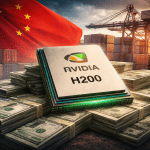In a bold and high-stakes intervention, the Dutch government has taken control over the Netherlands-based semiconductor firm Nexperia, owned by China’s Wingtech, citing serious governance concerns and risks to European economic security. This move marks one of the most forceful steps yet by a European power to assert authority over a strategic tech asset.
What Happened: Government Steps In Under Emergency Law
On 30 September 2025, the Dutch Ministry of Economic Affairs invoked the Goods Availability Act (Wet beschikbaarheid goederen) in response to what it described as “recent and acute signals of serious governance shortcomings and actions” at Nexperia.
Under that order, the Dutch state now has the power to block or reverse management decisions that might be harmful to Nexperia’s interests, its future as a European enterprise, or the continuity of critical supply chains. However, day-to-day production is allowed to proceed.
The government emphasised that the measure is “highly exceptional” and aimed specifically at safeguarding technological and economic sovereignty in the Netherlands and Europe.
Why Now: Governance, Supply & Security Concerns
Dutch authorities argue that deficiencies in Nexperia’s internal governance threaten Europe’s ability to rely on continuity of semiconductor supplies in emergencies. They warn that technology and know-how could be diverted or even disrupted under foreign pressure.
The firm produces essential chips used in industries such as automotive and consumer electronics—a sector where disruptions ripple quickly.
Moreover, the timing follows escalating geopolitical scrutiny: the U.S. added Wingtech to its “entity list” in December 2024, restricting its access to American technology.
Reactions And Tensions: China, Wingtech & Europe
The Financial Times reports that Wingtech has vigorously protested the intervention, denouncing it as “excessive interference driven by geopolitical bias, not by fact-based risk assessment.”
In its Shanghai listing, Wingtech said its control would be “temporarily restricted,” but that it retains the economic benefits of ownership and plans legal action.
Its shares dropped about 10 % on the announcement.
China’s foreign ministry criticized the move as discriminatory and warned against politicising trade and investment.
Within the Netherlands, the decision is being watched closely as a test case for how far state power may be used to police foreign investments in strategic sectors.

Geert Wilders pictured at the Dutch government building, where recent decisions on strategic tech firms like Nexperia are being made.
What Changed Inside Nexperia
Part of the court order executed alongside the government intervention involved suspending Zhang Xuezheng, the Chinese chairman/CEO of Nexperia, from all company roles.
A non-Chinese director with “deciding vote” power is to be appointed, and control of key shares has been transferred to a Dutch legal custodian pending further decisions.
Sources suggest the restrictions include prohibiting Nexperia from relocating assets, appointing executives, or altering operations without government approval.
Broader Significance: Europe’s Tech Sovereignty Rising
Europe has long lagged behind in semiconductor independence. By intervening in Nexperia, the Netherlands signals a shift: that preserving domestic high-tech capacity may override some free-market principles in extraordinary circumstances.
This move echoes earlier actions: the UK forced Nexperia to divest its Newport fab in Wales over security concerns.
It could embolden other governments to adopt stricter controls over foreign tech investments, especially from China, in sectors considered strategic.
FAQs (People Also Ask)
Does the Dutch state now fully own Nexperia?
No. The intervention does not transfer ownership. Wingtech remains the legal owner, but the Dutch government now wields extraordinary oversight over board decisions.
Will chip production at Nexperia be disrupted?
Authorities have stated that regular production will continue. The intervention is designed to secure strategic control without halting operations.
Can Nexperia or Wingtech appeal this decision?
Yes. The company is expected to pursue legal remedies. Court appeals may challenge the intervention’s legality or scope.
Why was this act considered “highly exceptional”?
The Goods Availability Act is rarely used. The government considered the risks urgent enough to override normal commercial autonomy.
Final Thoughts
The Dutch government’s intervention in Nexperia, while unprecedented, underscores Europe’s commitment to securing its technological future and protecting critical industries. By proactively safeguarding semiconductor supply chains, the Netherlands is setting a benchmark for strategic foresight, ensuring that European innovation and economic stability remain resilient in an increasingly complex global landscape. This decisive step could inspire stronger collaboration across the EU to build a more self-reliant and secure high-tech ecosystem.














